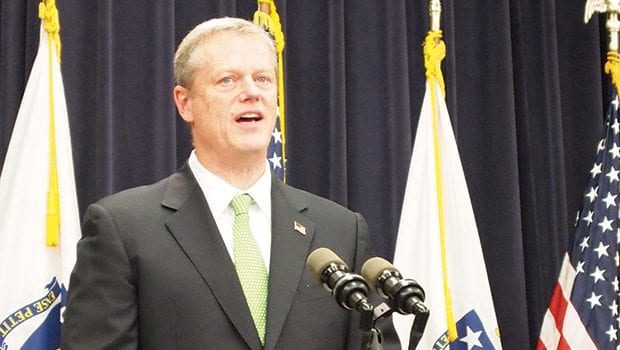As Baker assesses MBTA’s future, role of privatization considered
Carmen’s union president warns of indiscriminate use, Baker says focus is on service quality, not its provider

As officials struggle to turn the MBTA around, one bone of contention is the role that privatization should play. The administration of Governor Charlie Baker has been taking advantage of the MBTA’s exemption from the Pacheco law to explore greater levels of outsourcing.
The Pacheco law aimed to prevent officials from privatizing public services without first making a case that the private company would provide higher or equal quality service for less expense than could be achieved in-house, and that the cost savings would not be reliant on cutting employee wages and benefits. Opponents labeled it as “anti-privatization.”

State Secretary of Transportation Stephanie Pollack (left), MBTA General Manager Brian Shortsleeve (center) and Chief Operating Officer Jeff Gonneville (right) joined Gov. Baker for a presentation on the MBTA and the Fiscal and Management Control Board’s first year.
Last week, Baker held a meeting with reporters in which he reflected on the past year at the MBTA and on the next steps going forward. While privatization of several departments is under consideration, Baker said, generally speaking, he has no preference between public and private providers, only on whichever will provide the best service quality and lower costs.
“I don’t care if a service is provided publicly or privately. What I care about is performance, productivity and ensuring the money riders, taxpayers and cities and towns pay in to the system is well managed,” Baker said.
He also urged that privatization continue to be considered for MBTA departments.
“Don’t be afraid to change how services are delivered and vehicles are maintained,” Baker advised. “Actively seek out private partners — even let them make unsolicited proposals — to help the T find new and smarter ways to deliver for its customers.”
His remarks did not seem to dispel concerns from Jimmy O’Brien, president of Boston Carmen’s Union Local 589. The union represents workers in the MBTA’s warehouses and cash counting department, also called the “money room,” both of which are being considered for privatization.
O’Brien said in a statement to the Banner that the Baker administration seems to treat privatization as the only feasible method of reform, ignoring other potential solutions, and seems set on the path to increasingly outsource departments.
“Privatization is not a magic wand,” O’Brien said in the statement, adding that it is no guarantee of better service or lower costs. “Conversations before the [MBTA Fiscal and Management Control Board] continually focus on finding cost savings for the MBTA, making necessary investments and improvements for the system, and giving riders a better performing public transportation system — but all we hear is how privatization is the only way to do that.”
Under consideration for privatization: the Charlie Card store, money room and warehouse stock rooms.
Reforming the T
The MBTA struggles with a wide range of problems, including difficulty utilizing capital funds, reliance on paper records and transactions, poor handling of paid overtime and absenteeism, aging infrastructure and difficulty completing projects, Baker told reporters.
In the past year, the MBTA has achieved greater transparency, quicker response times and management improvements, he said. The MBTA will continue to focus on improving operations, finding savings and delivering more projects on time, Baker said.
Near future plans include transitioning the MBTA to digital handling of transactions and record keeping and utilizing the state’s often more favorable procurement deals for items they both purchase. Baker also promised doubled spending on infrastructure over the next five years.
Assessing privatization
Among other aspects, the Pacheco law required the agency to consider the cost to the state of transitioning to a private provider, including any unemployment benefits due to cut positions, performance monitoring expenses and tax loss if the company employs outside the state. State Auditor’s Office guidelines, issued in 2012, call for the agency also to compare savings from privatization against savings from the most cost-efficient method of providing the services in-house.
With the Pacheco law suspended, some are concerned that such considerations will not take place.
Rafael Mares, vice president and director of Healthy Communities and Environmental Justice at the Conservation Law Foundation, said privatization can be a useful tool, but that in each circumstance it must be weighed against other options to determine whether it truly is the best tool here.
“I’ve lately seen a pattern of identifying a problem at the T and saying privatization is the only solution,” or the only alternative to the status quo, Mares told the Banner in a phone interview.
One example he pointed to is the privatization of police dispatch work. While engaging other workers for this frees up police officers for patrol work, handling this through privatization is not expected to bring notable savings.
According to CommonWealth Magazine, cost reduction from this privatization will be minor, with the most significant amount coming from not having to pay pensions for the outsourced workers.
O’Brien has previously pointed to Keolis Commuter Services, which runs the commuter rail, as an example of a privatization effort that has not managed the cost-savings and performance expected of it.
Baker told reporters he expects that contracting out managing and operating of the T’s money room and warehousing could be done at lower costs and for better performance.






